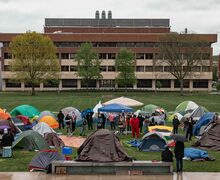When it comes to COVID-19, SU can only do so much. Students must step up.
Emily Steinberger | Photo Editor
Since Feb. 13, there have been a total of 119 positive COVID-19 tests among people accessing campus, and as of Tuesday, there are 133 students in quarantine. The sudden rise in cases is linked to a string of large or maskless parties hosted off-campus.
The disregard for social distancing and the dangers of COVID-19 have placed the spring semester at risk, though New York state will now require SU to shut down only if its positivity rate reaches 5%, or 880 cases. Regardless of whether testing has improved or SU has implemented new guidelines, students should be as careful — if not more careful — than last semester.
This semester, school officials, alongside the university’s COVID-19 response team, implemented several key changes to the 2020 fall semester’s COVID-19 regulations.
The biggest change includes replacing the swab collection kits with SalivaDirect, a testing method developed by the Yale School of Public Health. SalivaDirect yields faster test results, which will allow SU to administer more than twice the amount of tests than the fall semester.
Alexis Chu, a junior and former COVID-19 testing volunteer, said this semester’s testing protocol should be better than last semester’s.
“It’s easier to give tests, process them and send out results. It could also be easier for those analyzing the tests as well.”
To further expedite the testing process, the testing center in the Carrier Dome has been expanded. Tests will now be sent to the Life Sciences Complex instead of Upstate Medical University for analysis.
However, the full effects of these changes may not be seen, with the university already reporting more than 100 positive tests within the first month of the semester.
“Some people think that if they got COVID-19 once, they won’t get it again. So the people that have already gotten it once don’t care as much,” Chu said when asked why she thinks some students have become more relaxed.
While it is rare that one contracts the virus more than once, there is still a possibility of reinfection. And though reinfection is rare, various strains of the virus, which were found in the United Kingdom and South Africa, have spread to the United States.
There is still a lot that is unknown about the new strains, according to the Centers for Disease Control and Prevention. The ever-changing state of the virus and how it affects the human body continue to pose as big of a threat as they did last year.
Regardless of whether you’re relying on vaccination or have already received a vaccination, one must continue to be an active participant in COVID-19 protocols. Gov. Andrew Cuomo announced on Feb. 19, 12% of New Yorkers have received at least one dose of the COVID-19 vaccine.
While New York and other states are rolling out various forms of a COVID-19 vaccine, students will most likely not receive the vaccine for a while longer.
New York state is in the middle of a two-stage vaccination distribution plan. The first two stages include first responders; individuals who are 65 years old and older; and those with specific preexisting health conditions, just to name a few. But students without preexisting conditions should not be relying on getting the vaccine soon.
Before receiving the vaccine, students can take several steps to slow the spread of the virus and keep themselves and others safe. Practicing social distancing, frequently washing hands and wearing masks are essential parts of the process. But you can take it one step further.
In a report published by the CDC, experts suggest double-masking with a cloth mask and a medical procedural mask. This method can significantly decrease the amount of particles expelled or inhaled, which further prevents contracting or spreading the virus.
Another way to protect yourself is to frequently wipe down your most-used surfaces when getting back home. Pens, laptops and phones all come in contact with several surfaces and dirty hands, so it’s important to wipe them down as often as possible.
SU has also created a Public Health Guidance page that outlines ways to minimize risk for contracting COVID-19. Activities such as going to a bar, visiting friends at another school and eating inside at a restaurant all pose a significant risk and should be avoided.
Protecting your loved ones, your classmates and your community from the threat will take a continual effort. Understanding the implications of the virus and how it not only affects yourself but also how it affects others should be a priority for all students. It will take a campus-wide effort to return to a somewhat normal semester. Do your part.
Isaac Ryu is a junior broadcast and digital journalism major. His column appears biweekly. He can be reached at [email protected].
Published on February 23, 2021 at 8:26 pm





